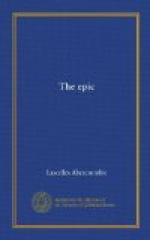THE EPIC SERIES
By the general process of epic poetry, I mean the way this form of art has constantly responded to the profound needs of the society in which it was made. But the development of human society does not go straight forward; and the epic process will therefore be a recurring process, the series a recurring series—though not in exact repetition. Thus, the Homeric poems, the Argonautica, the Aeneid, the Pharsalia, and the later Latin epics, form one series: the Aeneid would be the climax of the series, which thence declines, were it not that the whole originates with the incomparable genius of Homer—a fact which makes it seem to decline from start to finish. Then the process begins again, and again fulfils itself, in the series which goes from Beowulf, the Song of Roland, and the Nibelungenlied, through Camoens and Tasso up to Milton. And in this case Milton is plainly the climax. There is nothing like Paradise Lost in the preceding poems, and epic poetry has done nothing since but decline from that towering glory.
But it will be convenient not to make too much of chronology, in a general account of epic development. It has already appeared that the duties of all “authentic” epic are broadly the same, and the poems of this kind, though two thousand years may separate their occurrence, may be properly brought together as varieties of one sub-species. “Literary” epic differs much more in the specific purpose of its art, as civilized societies differ much more than heroic, and also as the looser milieu of a civilization allows a less strictly traditional exercise of personal genius than an heroic age. Still, it does not require any manipulation to combine the “literary” epics from both series into a single process. Indeed, if we take Homer, Virgil and Milton as the outstanding events in the whole progress of epic poetry, and group the less important poems appropriately round these three names, we shall not be far from the ideal truth of epic development. We might say, then, that Homer begins the whole business of epic, imperishably fixes its type and, in a way that can never be questioned, declares its artistic purpose; Virgil perfects the type; and Milton perfects the purpose. Three such poets are not, heaven knows, summed up in a phrase; I mean merely to indicate how they are related one to another in the general scheme of epic poetry. For discriminating their merits, deciding their comparative eminence, I have no inclination; and fortunately it does not come within the requirements of this essay. Indeed, I think the reader will easily excuse me, if I touch very slightly on the poetic manner, in the common and narrow sense, of the poets whom I shall have to mention; since these qualities have been so often and sometimes so admirably dealt with. It is at the broader aspects of artistic purpose that I wish to look.




